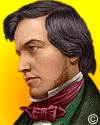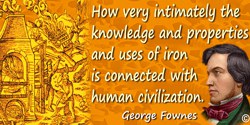 (source)
(source)
|
George Fownes
(14 May 1815 - 31 Jan 1849)
English chemist who prepared furfurine and benzoline (1845), the first examples of vegeto-alkali or organic salt-bases, as they were known then. Fownes was the first winner of the one hundred guineas (£105) Actonian Prize from the Royal Institution.
|
The Actonian Prize
SCIENTIFIC MISCELLANY.
A NEW SCIENTIFIC PRIZE ESSAY.
from The Galaxy magazine (Jan 1872)
IT is a fact of very great significance in the present state of science that the Royal Institution of Great Britain has offered the Actonian prize of two hundred guineas for the best essay illustrative of the wisdom and beneficence of the Almighty as seen in the Theory of the Evolution of Living Things. Competitors are to send in their essays before June 30, 1872, and the adjudication will be made by the managers of the institution in December of 1872. This event is noteworthy, not so much as an indication of the advance of science, as of the far deeper fact of the progress of enlarged and liberal feeling and of a steadily diminishing antagonism between religion and science. It is now a commonplace of history familiar to school-boys, that the sciences all had to struggle into existence against the most inveterate theological hostility, in each department of inquiry the new truth established contravened pre-existing opinions which had all the force of religious sanction. And worse than that, the dominant theological feeling discouraged and forbade all inquiry into the works and ways of nature as impious. To explore the heavens or the earth or the human body was regarded as but an irreverent prying into mysteries which were concealed from man by Divine design and which it was therefore wicked to attempt to penetrate. All that is now not only passed away, but the whole case is inverted, so that religion now seeks its proofs and supports from sources which it formerly pronounced sinful to examine.
And so it is with the special truths which science has arrived at. Doctrines at first denounced as heretical and blasphemous are afterward accepted not only as true, but as furnishing the most convincing proofs of the greatness and goodness of the Author of nature. The Bridgewater treatises were a series of elaborate works in which the great results of science in all its chief departments were brought forward to bear witness to the wisdom and beneficence of God.
The last* Actonian prize awarded by the Royal Institution was to Prof. Fownes for his essay** on the wisdom and goodness of the Almighty, as exemplified by the phenomena of chemistry in nature. And now it is proposed to appeal to the latest great principle of biological science—the principle of the Evolution of Life—as an evidence of creative wisdom. That life in its course is governed by a law of evolution, whatever be its formula or whatever its extent, is an incontestable truth; every adult is evolved from a germ. And as all truth must bear witness of the Author of truth, there is the same propriety in showing the bearings of the argument in this case as in any of the former instances of its application.
- Science Quotes by George Fownes.
- 14 May - short biography, births, deaths and events on date of Fownes's birth.
- George Fownes - Biography
- Galaxy Magazine (Jan 1872) - article on the Actonian Prize.
- George Fownes - Chemistry, as Exemplifying the Wisdom and Beneficence of God (1844).
- George Fownes - A Manual of Elementary Chemistry, Theoretical and Practical (1869), 10th ed.





